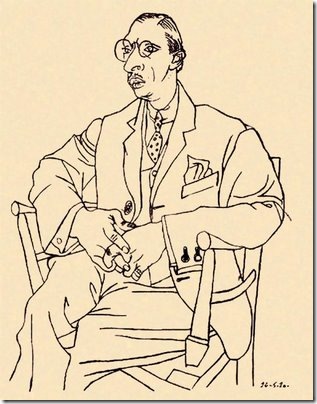Of the last concert in the 20th season of the Palm Beach Chamber Music Festival it need only be said that as the Crest Theatre audience sat there Sunday afternoon listening to L’Histoire du Soldat, the brilliance of Stravinsky’s conception became clear.
Which is only a fancy way of saying that the musicians and actors of the festival did this little masterwork proud, ending the first two decades of the festival on an excellent note.
This performance of L’Histoire du Soldat was a return engagement of sorts. The festival first mounted the work in 1997, and for the 2011 version the company was able to secure the services of the actors it had back in Season 6: Narrator Barbara Bradshaw, Joe Gillie as the soldier, and Randolph Dellago as the Devil.
Each of the actors did a very fine job, with just the right sense of exaggeration for the text, which is drawn from an Alexander Afasaniev retelling of a Russian folktale. This English translation from the original French of Stravinsky and Charles-Ferdinand Ramuz is in rhymed couplets, and it can sound ludicrous if the actors don’t know precisely what they’re doing.
But they did, and the story came off vividly and compellingly, even in its unreality, and even with the actors behind music stands making only minimal movements. That’s because Bradshaw, Gillie and Dellago know how to act well with their voices, just as the musicians next to them were able to get color and life out of their instruments.
Alexander Jimènez, who helped found the festival in 1992 and then went on to a career at Florida State University as director of the Tallahassee college’s orchestral activities, returned to conduct the three performances (the other two took place Friday in West Palm Beach and Saturday in Palm Beach Gardens), and did so with a clear, precise beat. The seven players – violinist Mei Mei Luo and bassist Jason Lindsay, clarinetist Michael Forte and bassoonist Michael Ellert, trumpeter Brian Stanley and trombonist Domingo Pagliuca, and percussionist Michael Launius – gave the music plenty of wit and cheek, nicely conveying the composer’s jazz-inflected score.
Violinist Luo was particularly good Sunday, making the music sound like folk fiddling part of the time, and ably handling the trickiest passages with flair. Stanley had some trouble with some of the more elaborate moments in his part, but overall this was an expert, enjoyable Soldier.
This season of the festival has had program changes for three of its four weeks because of the absence of flutist Karen Dixon, whose father died in early July. In place of the Mucyzinski Fragments and the Bach Second Orchestral Suite that would have preceded the Stravinsky, programmers instead offered the Schumann Piano Quintet (in E-flat, Op. 44).
This is one of the most beloved works in the chamber music repertoire, and for good reason. It has Schumann’s lyric gift in abundance and an easy-to-follow structure, as well as string writing that gives each player a moment or two at center stage.
Pianist Yang Shen was joined by violinists Dina Kostic and Monica Cheversan, violist Rebecca Diderrich and cellist Susan Bergeron — an all-female cast, as Bergeron noted in her informative and amusing remarks before the piece. And the five women gave this beautiful work a delectable performance.
Shen’s style throughout most of the piece inclined toward detached, precise lines, which perhaps goes against the tradition but added a nice, unsentimental touch that kept things breezy. Bergeron’s solo work in the first movement’s second subject was eloquent and fat-toned, and Diderrich provided strong playing in the partnering passages (no shrinking viola, she).
In the second movement, the ensemble reached something exceptional in the C major section that follows the opening dead march; here, all five musicians played with a kind of hushed serenity that was as beguiling as it was moving. The agitato section was suitably tense and fiery, with each player hitting the accents with gusto.
The contrasting trio sections of the third movement were very effective after the scalar rush of the opening pages, which were almost brittle rather than muscular; a little more legato from Shen might have added some extra shading. Still, it was an athletic reading that won pre-ending applause from the large house at the Crest.
The finale was confident and powerful, and the closing double fugue had a forthrightness that made the music sound logical rather than stunt-like, its archaism fitting right into the rest of the movement without being out of place. It was, in sum, a most satisfying and enjoyable rendition of this great quintet.
In his remarks before the Stravinsky, Jimènez made a pitch for continued support of the festival. “They don’t have to do this,” he said, then detailed the busy lives of his colleagues on stage. It was a point that needed to be made, and the end of the 20th season was a perfect time for it.
This chamber music series remains rare and precious for several reasons, one of them being that its organizers have tried hard not to do the easy box-office thing and perform only sure-fire hits. That makes it more of a shared exploration than an exercise in summer pops, and that makes it stand out.
The other big reason is that for 20 summers these musicians who could be doing something else have continued to mount these concerts, and that is ultimately a gift of love and interest from people who truly care about their art form. And if that’s not worth preserving or supporting, then no art is.
Because it’s only when artists give all they have that they can redeem their art, and their audience in the process, and in its modest, regular way, that’s exactly what the Palm Beach Chamber Music Festival has been doing since July of 1992.
